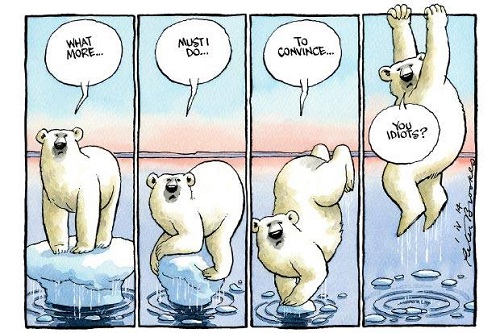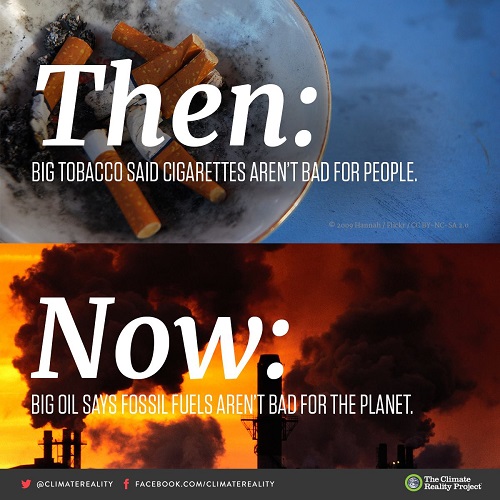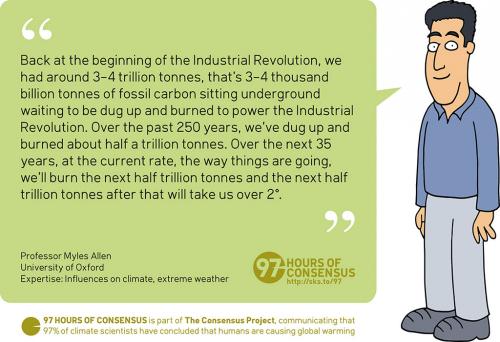2016 SkS Weekly Digest #18
Posted on 1 May 2016 by John Hartz
SkS Highlights... El Niño to La Niña... Toon of the Week... Quote of the Week... He Said What?... SkS in the News... SkS Spotlights... Coming Soon on SkS... Poster of the Week... SkS Week in Review... 97 Hours of Consensus...
SkS Highlights
Can the Republican Party solve its science denial problem? by Dana Nuccitelli garnered the highest number of comments among the articles posted on SkS during the past week. The article was originally posted on the Climate Consensus - the 97% Guardian blog maintained by Nuccitelli and John Abraham where it generated a lengthy and quite contentious comment thread. Click here to access the Guardian article and comment thread.
El Niño to La Niña
Withering drought and sizzling temperatures from El Nino have caused food and water shortages and ravaged farming across Asia, and experts warn of a double-whammy of possible flooding from its sibling, La Nina.
The current El Nino which began last year has been one of the strongest ever, leaving the Mekong River at its lowest level in decades, causing food-related unrest in the Philippines, and smothering vast regions in a months-long heat wave often topping 40 degrees Celsius (104 Fahrenheit).
Economic losses in Southeast Asia could top $10 billion, IHS Global Insight told AFP.
The regional fever is expected to break by mid-year but fears are growing that an equally forceful La Nina will follow.
That could bring heavy rain to an already flood-prone region, exacerbating agricultural damage and leaving crops vulnerable to disease and pests.
El Nino dries up Asia as its stormy sister La Nina looms by Satish Cheney, Phys.org, Apr 29, 2016
Toon of the Week

Hat tip to I Heart Climate Scientists
Quote of the Week
"Loss of oxygen in the oceans is one of the serious side effects of a warming atmosphere, and a major threat to marine life," said Matthew Long*, who is the lead author of the study. "Since oxygen concentrations in the ocean naturally vary depending on variations in winds and temperature at the surface, it's been challenging to attribute any de-oxygenation to climate change. This new study tells us when we can expect the effect from climate change to overwhelm the natural variability."
*National Center for Atmospheric Research (NCAR)
It May Soon Be Too Late to Save the Seas by Jeff Nesbit, Climate/US News & World Report, Apr 27, 2016
He Said What?
“The coal industry is being destroyed,” he* says. “And it’s scary to me because electricity is a staple of life — like potatoes were to the Irish. And Obama has largely destroyed reliable, low-cost, affordable electricity in America.”
*Robert E. Murray, chairman of the Murray Energy Corporation
A Crusader in the Coal Mine, Taking On President Obama by Jad Mouawad, Energy & Environment, New York Times, Apr 30, 2016
SkS in the News
Consensus on consensus: a synthesis of consensus estimates on human-caused global warming , Cook et al, Environmental Research LettersVolume 11, Number 4, Apr 13, 2016 has generated a slew of articles in the media and blogosphere. A list of those articles will be published as SkS News Bulletin #1 later this week.
SkS Spotlights
The Carbon Pricing Leadership Coalition brings together leaders from across government, the private sector and civil society to share experience working with carbon pricing and to expand the evidence base for the most effective carbon pricing systems and policies.
The Coalition is a voluntary partnership of national and sub-national governments, businesses, and civil society organizations that agree to advance the carbon pricing agenda by working with each other towards the long-term objective of a carbon price applied throughout the global economy by:
- strengthening carbon pricing policies to redirect investment commensurate with the scale of the climate challenge;
- bringing forward and strengthening the implementation of existing carbon pricing policies to better manage investment risks and opportunities; and
- enhancing cooperation to share information, expertise and lessons learned on developing and implementing carbon pricing through various "readiness" platforms
The Coalition will collect the evidence base, benefiting from experience around the world in designing and using carbon pricing, and use this input to help inform successful carbon pricing policy development and use of carbon pricing in businesses. It will also deepen understanding of the business and economic case for carbon pricing. In that role, it is developing pathways for use by companies, investors and governments that will illustrate plausible outlooks under a variety of carbon pricing policies and timelines. Finally, the coalition will work to bring together government and business in leadership dialogues that identify and address the most pressing issues, and in doing so, accelerate the use of carbon pricing around the world.
Coming Soon on SkS
- Peabody coal's contrarian scientist witnesses lose their court case (John Abraham)
- Handy resources when facing a firehose of falsehoods (Baerbel)
- Scientists are figuring out the keys to convincing people about global warming (Dana)
- Consensus on Consensus (AndyS)
- Deep sea microbes may be key to oceans’ climate change feedback (Howard Lee)
- 2016 SkS Weekly News Roundup #19 (John Hartz)
- 2016 SkS Weekly Digest #19 (John Hartz)
Poster of the Week

SkS Week in Review
- 2016 SkS Weekly News Roundup #18 by John Hartz
- Tracking the 2°C Limit - March 2016 by Rob Honeycutt
- Can the Republican Party solve its science denial problem? by Dana Nuccitelli (Climate Consensus - the 97%, Guardian)
- Climate1x - Free Online Climate Science Course starts May 3rd by Sara Harris
- Climate scientists are now grading climate journalism by Daniel Nethery and Emmanuel Vincent (Climate Consensus - the 97%, Guardian)
- A global coalition mapping and motivating decarbonization by Joseph Robertson (Climate Consensus - the 97%, Guardian)
- 2016 SkS Weekly Digest #17 by John Hartz
97 Hours of Consensus: Myles Allen
































 Arguments
Arguments






























The thought occured that if the warmer oceans hold less oxygen they may be holding less CO2 too. Is that bad news for the atmosphere or is the CO2 chemically bound to the water, not just 'dissolved' in it?
In california we have cap and trade
That's added 12cents to the price of gasoline.
But what's worse its added 15Cents to the price of a bag of cement. This is Because it tajes enormous energy & heat to make cement. But how does making cement more expensive green house gases. the higher price will not reduce cement use. Its just a form a taxation. And the revebue appears to be going into the genmral fund , not even supporting green house reduction opportunities.
Fairoakien - "the higher price will not reduce cement use". You think? How about the development of carbon-neutral cement eg. see review article from Nature or here. Recent news here. How would you propose such research is paid for if not by tax? And what about the role of tax in making the new product competitive with tradition concrete or would you prefer blanket ban on traditional cement as green cement becomes available?
Of course, someone who figures how to do construction with less concrete may have competitive advantage over someone doesnt in tender which also works to reduce cement use.
If you dont like tax-based solutions, what is your preferred solution to reducing emissions?
Kiwiiano - my understanding is that on a very long time scale, warming oceans will release CO2, but with mixing rates of around 1000 yrs, this isnt an immediate (100yr) concern. On the shorter time scales, you would expect the ocean to become less efficient in soaking up CO2. See here for more.